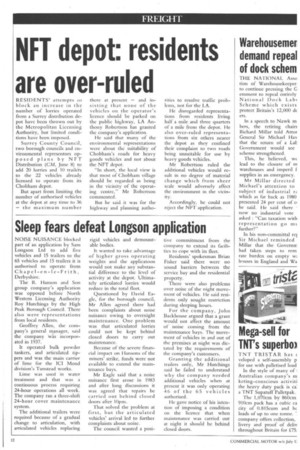Sleep fears defeat Longson application
Page 14

If you've noticed an error in this article please click here to report it so we can fix it.
NOISE NUISANCE blocked part of an application by Sam Longson Ltd to add five vehicles and 15 trailers to the 65 vehicles and 15 trailers it is authorised to operate from Chapel-en-le-Frith, Derbyshire.
The R. Hanson and Son group company's application was opposed before North Western Licensing Authority Roy Hutchings by the High Peak Borough Council. There also were representations from local residents.
Geoffrey Allen, the company's general mtanager, said the company was incorporated in 1937.
It operated bulk powder tankers, and articulated tippers and was the main carrier of lime for the ICI Mond division's Tunstead works.
Lime was used in water treatment and that was a continuous process requiring 24-hour operations all week. The company ran a three-shift 24-hour cover maintenance System.
The additional trailers were required because of a gradual change to articulation, with articulated vehicles replacing rigid vehicles and demountable bodies.
It wanted to take advantage of higher gross operating weights and the applicatoon would not make any substantial difference to the level of activity at the depot. Ultimately articulated lorries would reduce in the total fleet.
Questioned by David Eagle, for the borough council, Mr Allen agreed there had been complaints about noise nuisance owing to overnight maintenance. One problem was that articulated lorries could not be kept behind closed doors to carry out maintenance.
Because of the severe financial impact on Hansons of the miners' strike, funds were not available to extend the maintenance bays.
Mr Eagle said that a noise nuisance first arose in 1983 and after long discussions it was agreed that repairs be carried out behind closed doors after 10pin.
That solved the problem at first, but the articulated vehicles' arrival led to further complaints about noise.
The council wanted a posi tive commitment from the company to extend its facilities to cope with its fleet.
Residents' spokesman Brian Fisher said there were no sound barriers between the service bay and the residential property.
There were also problems over noise of the night movement of vehicles. He said residents only sought restriction during sleeping hours.
For the company, John Backhouse argued that a grant would not affect the amount of noise coming from the maintenance bays. The movement of vehicles in and out of the premises at night was dictated by the requirements of the company's customers.
Granting the additional trailers only, Mr Hutchings said he failed to understand why the company needed additional vehicles when at present it was only operating 46 of the 65 vehicles authorised.
He gave notice of his intention of imposing a condition on the licence that when maintenance was carried out at night it should be behind closed doors.




















































































